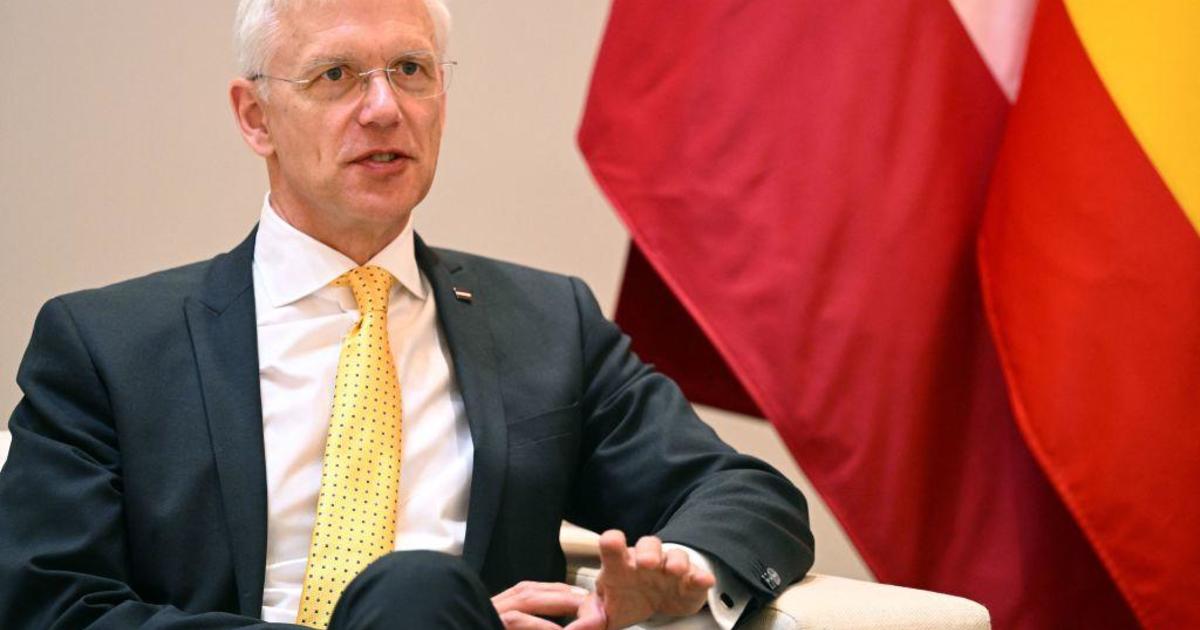Latvian Prime Minister Arturs Krisjanis Karins holds a meeting with his Spanish counterpart at La Moncloa in Madrid, on June 13, 2022.
GABRIEL BOUYS/AFP via Getty Images
Washington — Latvia’s Prime Minister Krisjanis Karins has warned European and U.S. leaders not to succumb to “war weariness” as Russia’s war in Ukraine grinds on, helping to drive energy and food prices higher around the world. In an interview with CBS News, Karins said leaders of countries that aren’t experiencing war first-hand can become “tired or less committed to aiding the country which is in need.”
He urged countries struggling with inflation to accept it as a small price to pay, as “Ukrainians are paying with their lives.”
This week, NATO announced the military alliance’s high-readiness forces would be significantly increased from 40,000 to more than 300,000 troops, with a focus on increasing the Eastern flank, close to the EU’s borders with Russia.
Latvia, a NATO member sharing a land border with Russia, will host the largest NATO force on the Eastern flank with 1,887 troops. Lithuania will have 1,632 and Estonia 1,430. Karins praised the U.S. for its decision to increase the troop presence in the east, saying the announcements made at a NATO summit in Madrid had put the security alliance “on the right track.”
As he left that summit, President Joe Biden vowed that the U.S. would continue to support Ukraine for “as long as it takes,” and he said more military aid would be announced in the coming days.
Earlier in the week, Mr. Biden reiterated America’s commitment to defend its NATO allies, referencing the Article 5 collective defense clause in the alliance’s charter.
“We mean it when we say an attack against one is an attack against all,” the president said Wednesday.
During a visit to Turkmenistan on Thursday, President Vladimir Putin said Russia would outlast Ukraine — whose sovereignty he has repeatedly called into question — saying he was in no hurry to end the war that he refers to only as a “special military operation.”
And German Chancellor Olaf Scholz also said in an interview with CBS News’ Margaret Brennan Thursday that Putin, having prepared for his war on Ukraine for at least a year before inciting it, is likely ready to wage his offensive for a “long time.”
Margaret Brennan speaks with German chancellor about Russia
01:56
Karins said NATO leaders shouldn’t worry about provoking the Russian autocrat, as “there’s nothing that we in Europe, or in NATO, can do to provoke or not to provoke Putin. He is on his own trajectory, regardless of what it is that we do.”
In early June, French President Emmanuel Macron warned that “we must not humiliate Russia so that the day when the fighting stops we can build an exit ramp through diplomatic means.”
Karins argues there is “political danger” in the argument “that we need peace at any cost, because that translates to peace at the cost of Ukraine.”
The Latvian leader called it “ludicrous” to imagine any world leader being willing to give up any part of their own nation’s territory.
According to a May survey by the Washington Post, 72% of Latvian speakers in Latvia saw Russia as the primary threat to their country, and almost 80% of Latvian speakers supported a larger NATO presence. With a long history of Russian invasion and occupation, the threat of Russia looms large over the collective Latvian subconscious.
Karins warned that a Russian victory in Ukraine “would radically change world order.”
“It’s like giving the devil your little finger. It might seem good at first, but in the end, you’re essentially in the first step of giving up your own way of life,” he said.
Latvia has already been on the receiving end of Russia’s aggression in the form of cyberattacks and disinformation. Karins described a “steady barrage” of Russian cyberattacks, which he said his own country’s defense forces had managed to to stay one step ahead of.
Latvia has been targeted with cyberattacks by the Russian hacking group “Killnet” and its associated groups since May, according to Latvian Radio.
Russia’s disinformation campaign has also targeted Russian speakers in Latvia in an effort to “try to split our society,” according to Karins. Since Putin launched his full-scale invasion of Ukraine on February 24, Latvia’s media watchdog has shut down more than 100 television channels and websites spreading Russian propaganda, Karins told CBS News.
Just as important, Karins said, have been Latvia’s efforts to fill the void left by those Russian language channels with objective information.
“We all need to do a little more,” he said. “If Latvia, which is not the richest of countries in Europe, can donate the equivalent of one third of our annual military budget to Ukraine, then certainly some of our friends and neighbors, who are relatively more wealthy, can probably donate a little bit more than they have today.”
